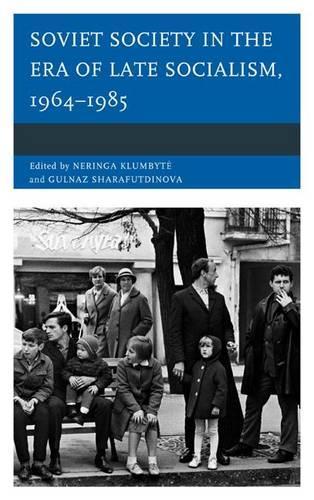
Soviet Society in the Era of Late Socialism, 19641985
(Paperback)
Publishing Details
Soviet Society in the Era of Late Socialism, 19641985
By (Author) Neringa Klumbyte
Edited by Gulnaz Sharafutdinova
Contributions by Dominic Boyer
Contributions by Kate Brown
Contributions by Robert Edelman
Contributions by Larisa Honey
Contributions by Olga Livshin
Contributions by Anna Paretskaya
Contributions by Benjamin M. Sutcliffe
Contributions by Sergei I. Zhuk
Bloomsbury Publishing PLC
Lexington Books
18th September 2014
United States
Classifications
Professional and Scholarly
Non Fiction
Social and cultural history
Far-left political ideologies and movements
Regional / International studies
947.084
Physical Properties
Paperback
260
Width 153mm, Height 230mm, Spine 19mm
390g
Description
What did it mean to be a Soviet citizen in the 1970s and 1980s How can we explain the liberalization that preceded the collapse of the USSR This period in Soviet history is often depicted as stagnant with stultified institutions and the oppression of socialist citizens. However, the socialist state was not simply an oppressive institution that dictated how to live and what to thinkit also responded to and was shaped by individuals needs. In Soviet Society in the Era of Late Socialism, 196485, Neringa Klumbyte and Gulnaz Sharafutdinova bring together scholarship examining the social and cultural life of the USSR and Eastern Europe from 1964 to 1985. This interdisciplinary and comparative study explores topics such as the Soviet middle class, individualism, sexuality, health, late-socialist ethics, and civic participation. Examining this often overlooked era provides the historical context for all post-socialist political, economic, and social developments.
Reviews
This volume and other recent studies compel us to reexamine the meaning and nature of late socialism. Even if the Kremlin leadership thought the social foundation on which they stood was firm and stable, it was continually shifting under their feet. * The Russian Review *
Although scholars in the Humanities and Social Sciences have long recognised the stagnation paradigms limitations, consensus on the need for a more nuanced set of concepts, analytical tools, and periodisations for the study of Soviet society in the 1970s1980s has only begun to crystallise in recent years. This volumes welcome appearance speaks to the rapidly growing interdisciplinary interest in the social experience of living in the Soviet Union from the Brezhnev era (19641982) through Perestroika. Political scientists Neringa Klumbyte and Gulnaz Sharafutdinova bring together a welcome collection of essays dealing with a range of topics relevant to social change during these decades. . . .[T]his volume advances our field and sets the agenda for scholarly discussion on Late Socialism for the near future. * Europe-Asia Studies *
Revisiting the period of late socialism in the USSR, contributors to this volume search out the rhythms and contours of everyday life and find a multi-vectored reality far removed from conventional Western stereotypes. Cold War Warriors will read this book at their peril. -- Michael Urban, University of California Santa Cruz
This stimulating collection is one of the first works to delve into the dynamics of daily life under Brezhnev. Its portrayal of a vibrant society which cultivated individualism and consumerism throws down a challenge to conventional wisdom which sees the Soviet Union as a drab monolithic of miserable conformists. -- Peter Rutland, Wesleyan University
Author Bio
Neringa Klumbyte is an assistant professor at Miami University (Ohio). Gulnaz Sharafutdinova is an associate professor of political science and international studies at Miami University (Ohio).
